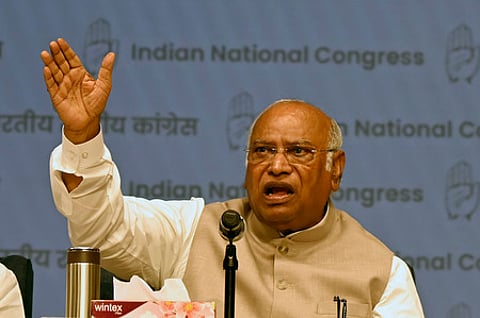

With the government's flagship 'Digital India' programme completing ten years, Prime Minister Narendra Modi on Tuesday claimed credit for the scheme, which he insisted has by now become a "People's Movement."
The flagship initiative launched by the government on July 1, 2015 had the grand "vision to transform India into a digitally empowered society and knowledge economy."
The Centre's 'Digital India website claims that the programme has been "improving the lives of all citizens through the digital delivery of services, expanding the digital economy and employment opportunities."
In a blog post on LinkedIn, Modi, highlighted that if in 2014, India had around 25 crore internet connections, today that has grown to over 97 crore.
"From Banarasi weavers to bamboo artisans in Nagaland, sellers are now reaching customers nationwide, without middlemen or digital monopolies," Modi noted.
But Congress president Mallikarjun Kharge is not impressed in the least and confronted Modi with a series of facts that he says negate the claims of the Prime Minister.
The ground reality is not only in sharp contrast to what the government is claiming, but on top of that, the government has failed to secure the privacy of its citizens, Kharge said in a message posted on platform X.
The Congress President stressed that the fine print of Modi government's lofty claims of 'Digital India' is marred by unfulfilled promises and false claims and digital exclusion of the marginalised.
When it comes to privacy and transparency, Kharge noted that none less than PM Modi himself reportedly told Ministers and Secretaries that India saw over 10 crore cyberattacks since the Pahalgam terror attack.
In fact, cybersecurity incidents rose by about 76.25% from 2020 to 2024. These cases increased from 11.58 lakh in 2020 to over 20.41 lakh in 2024, Kharge said citing (CERT-In data)
Between 2022 and 2024, digital arrest scams and related cybercrimes in India have nearly tripled, and the money lost has risen 21 times, Kharge pointed out, relying on a reply from the minister concerned in the Rajya Sabha.
Kharge further noted that the RTI Act brought by the Congress party is being weakened by bringing a flawed Data Protection Law.
The basic object of the Right to Information Act has been to "empower the citizens, promote transparency and accountability in the working of the Government, contain corruption, and make our democracy work for the people in real sense."
Kharge had on March this year said that "On one hand, India has been on top in misinformation and disinformation for the past many years, and on the other hand, the Modi government is bent on weakening the Right to Information (RTI) Act implemented by the Congress-UPA by bringing in the Data Protection Act."
"Whether it is information in the public sector like the list of ration cards, beneficiary workers of MGNREGA, names of people involved in public welfare schemes, voter list in elections, or the names of scamster billionaires who fled abroad after taking loans from government banks - it is important for the public to have the names of all these in the public domain. But now the Modi government is weakening the RTI in the name of Data Protection, so that such names will no longer be made public," he said in a social media post in Hindi.
Further, citing the RBI, Kharge said, "We were told that Demonetisation will reduce Cash transactions, but Cash in Circulation has risen, even in the last year."
While mentioning unfulfilled promises and false claims, Kharge said as of June 26, 2025, a total of 6.55 lakh villages were supposed to be targeted for broadband connectivity, under the BharatNet project. Kharge alleged that out of the 4.53 lakh villages 65% of them are yet to be covered. The project's deadline has been revised at least eight times in 11 years.
A meagre - 0.73% (766) Gram Panchayats currently have active Wi-Fi services.
Moreover, Kharge noted that when the private players are opting for 5G, BSNL has not yet completed its target of deploying 1 lakh 4G towers. One-third towers left to be installed. Even after receiving three revival packages worth over Rs 3 lakh crore — Rs 69,000 crore in 2019, Rs 1.64 lakh crore in 2022, and Rs 89,047 crore in 2023, it still lags behind private players.
BSNL's debt rose by 291.7%, from Rs 5,948 crore in March 2014 to Rs 23,297 crore in March 2024. MTNL's debt increased by 136.2%, from Rs 14,210 crore to Rs 33,568 crore over the same period.
On the digital exclusion of the marginalised, Kharge said 75.3% of people aged 15 and above in the country do not know how to use a computer. This includes 81.9% in rural areas and 60.4% in urban areas, highlighting a significant digital skills gap. [NSS survey, 2020-21]
Nearly 7 crore registered workers excluded from MNREGA by imposing the condition of AADHAAR based payment, he noted.
Kharge went on to highlight that 54% of government schools do not have an internet connection, 79% have no desktop computer, 85% lack a projector, and 79% do not have a smart classroom. [UDISE+ 2023-24 report]
Listing out these shortcomings, Kharge urged Prime Minister Modi to reflect on the multiple failures and frauds inflicted by his government instead of glossing over national achievements and trying to seek credit for 10 years of Digital India.